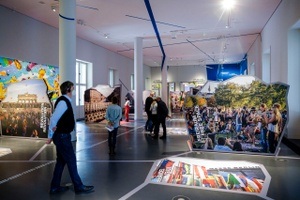Krise als Normalität − Aber für alle gleich?
In the organizer's words:
There is no doubt that we are living in times of crisis. A triple crisis of biodiversity loss, climate crisis and pollution, crisis of democracy, crisis of the welfare state, crisis of the German economy, crisis of international cooperation.
Every day, we as organizations and citizens are confronted with the effects of complex social and political developments.
Despite this universal crisis situation, the widespread reaction seems to be a retreat to core business and a rejection of transformative visions for the future. Increasingly, issues such as environmental protection and social justice are being weighed against economic growth and the consolidation of a supposed "middle ground".
Development cooperation and humanitarian aid must be worthwhile for German export interests. Sustainability strategies in companies are losing their significance, and a green restructuring of industry is being called into question. International processes are failing to find consensus or are fading into a standstill in implementation.
We want to discuss with experts how various political actors are dealing with the crises and how they view social, political and economic upheavals. What strategies are needed, what new alliances or sharpening of differences? What responsibilities, power structures and solutions can we identify in this supposed new normality of crises? And: Are we actually all living in the same crisis?
A discussion with
Dr. Julia Duchrow, Secretary General of Amnesty International Germany
Frederik Palmer, Head of Staff Unit for Policy and Future Issues, AWO Federal Association
Sebastian König, Managing Director of BUND Thuringia
Dr. Evin Zozan, Circular Economy & Sustainability Officer, German Association of the Automotive Industry
Moderation: Marie-Luise Abshagen, Deputy Head of Forum Environment and Development
Arrival and registration from 18:00.
This content has been machine translated.













